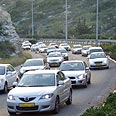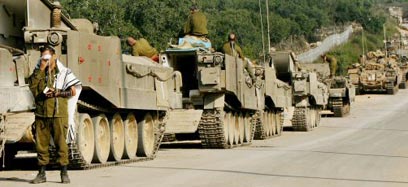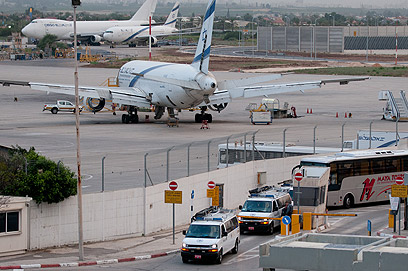
The Home Front Command regularly drills extreme situations which may arise from a wide spread missile attack on Israel and these drills are personally supervised by the Prime Minister's Office.
Related Stories
- 80% of residential building shelters unusable
- TA residents vulnerable to ballistic missile strike
- Hazardous materials found in central Israel shelters
At the end of the Second Lebanon War the state comptroller filed a report detailing the various shortcomings of the transportation system, especially with regards to coordination between authorities, the protection of public transportation vehicles and major transit terminals, and mobilizing mass populations.
A special committee also found deficiencies in the conduct of the companies in charge of public transportation.

IDF Convoy in Second Lebanon War (Photo: Reuters)
Has anything changed since? MK Otniel Schneller (Kadima), former chairmen of the Knesset State Comptroller Committee, said that many of the deficiencies have been fixed, but there are still big challenges facing those in charge of transportation.
"We can say the public transport companies are quite prepared despite weak spots like the protection of passengers or a shortage in drivers since some will be called for reserve duty." He said. "One of the main problems is coordination between different bodies. Sometimes the police cordons off areas and then the citizens have to decide where to go. This demands coordination between military and civilian systems in order to enable delivery of information"
According to Schneller the protection of transport stations has been partly dealt with: "Many resources have been invested to prevent damage to locations with passengers in waiting," He said. "A lot of work has been done in bus and train stations."
Another potential problem is the issue of mass population fleeing from bombarded areas. Lately a special plan has been to receive hundreds of thousands of civilians fleeing to Eilat, something which may place a heavy burden on the roads and transportation systems in the south which are supposed to be requisitioned by the IDF to transport equipment during wartime.
Another pressing issue is air transport, since airports would become strategic targets for missile attacks. One of the alternatives being considered is to keep civilian planes in other countries and bring them to Israel only for a short while to enable passengers to embark.

Airplanes at Ben Gurion International Airport (Photo: Ben Kelmer)
Senior officials at the transport ministry who admitted after the state's comptroller 2008 report that it would take long time to deal with the issues are optimistic about their readiness in case war breaks out.
"I 'm not authorized to say we're prepared or ready but there certainly work to do," said Michal Kala, general manager of the Transport Ministry. "Today we have a home front minster and ministry and we constantly deal with these situations. There are written procedures and all the parties involved speak the same language".
Kala said that the transport ministry is also coordinating with the ministry of industry, trade and labor and the National Security Council and the prime minister himself has recently verified that they're ready if push comes to shove.
- Receive Ynetnews updates
directly to your desktop















